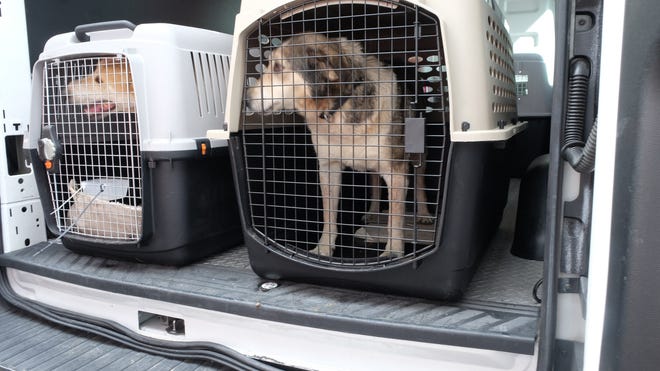As of Thursday, August 1, flying with your dog will get trickier.
In May, the Centers for Disease Control and Prevention (CDC) announced an update to its dog importation regulation to “protect the health and safety of people and animals by making sure any dog arriving in the United States is healthy and doesn’t present a risk to our communities” and to bring it more in with the World Organization for Animal Health’s standards for the international movement of dogs from countries with a high risk of dog rabies.
“Furthermore,” the CDC statement said, “it addresses recent challenges seen with international dog importations, such as fraudulent documentation and dogs housed in unsafe conditions if they didn’t meet requirements for entry to the United States.”
In practice, getting ready for the change has resulted in headaches for everyone from military families and diplomats to pet shippers and animal rescue organizations, especially those in disaster areas, due to what critics call confusing instructions and unnecessary complications. Multiple airlines have since stopped allowing dogs to travel to the U.S. with their families.
What are the new CDC regulations about dogs on airplanes?
The new regulation puts the following changes in effect as of August 1:
- All dogs under 6 months old are banned from entering the U.S.
- Dogs must appear “healthy upon arrival”
- Dogs older than six months must show proof they have not been in a country identified as high-risk for rabies or face potential quarantine.
- Dogs must be microchipped.
- Dogs must have a CDC Dog Import Form online submission receipt.
Additional restrictions and requirements apply depending on where the dog has been and where it was vaccinated. If it’s been in one of the more than 100 countries identified as high risk for rabies, your dog may need to pass a blood test or be quarantined for 28 days at one of six CDC-registered animal care facilities. Those facilities are in Atlanta, Los Angeles, Miami, New York City, Philadephia and Washington, D.C.
According to the CDC, airlines will also be required to create an air waybill for each dog transported to the U.S., a document Elizabeth Schuette, president and CEO of the ARK Import Export Center at John F. Kennedy International Airport in New York, said was previously only required for dogs being transported as cargo. Airlines can request a waiver for this rule, but several, including Lufthansa, Finnair, Swiss International Air Lines, and Austrian Airlines, initially announced they would no longer allow dogs to fly to America in the cabin or in baggage hold as a result.
Major U.S. airlines including American, Delta, United and Southwest say the new CDC rules do not change their policies around carrying pets, but all said passengers must fill out the paperwork as required. Delta and American said they are pausing pet shipments in their cargo divisions.
How can I tell if I can bring my dog into the US?
The CDC has a personalized question-and-answer tool, “DogBot,” that can tell you what rules apply to your dog depending on travel dates, countries and vaccination dates.
On the road with your pet:Are you traveling with dogs or cats this summer? Download these helpful apps
What are Florida’s pet laws?
Florida does not restrict entry of pets like dogs and cats into the state, unless you’re bringing them in to sell. You’ll need current rabies vaccination documentation. Some Florida counties require pets to wear a rabies tag at all times.
According to Florida Statutes, dogs and cats transported into Florida to be sold must be tested and vaccinated between 14 and 30 days and receive an official certificate of veterinary inspection before entry into the state and be vaccinated or treated against rabies, roundworms and hookworms. Also canine distemper, leptospirosis, bordetella, parainfluenza, hepatitis and canine parvo (for dogs) and panleukopenia, feline viral rhinotracheitis, and calici virus (for cats).
Does Florida allow exotic pets?
That depends on what types of exotic pets you want.
The following wildlife may be kept as personal pets without a permit in Florida:
- Nonvenomous and unprotected reptiles or amphibians
- Gerbils, guinea pigs, hamsters
- Hedgehogs
- Honey possums
- Sugar gliders
- Rats, mice,
- Moles, shrews
- Rabbits
- Squirrels, chipmunks
- Domestic or European ferrets,
- Prairie dogs
- Chinchillas
- Shell parakeets
- Canaries
- Lovebirds
- Cockatiels
- Parrots
- Finches
- Myna birds
- Toucans
- Ringed doves, ruddy doves, diamond doves
- Button quail
Many other species may be kept as personal pets with a permit from the Florida Fish & Wildlife Conservation Commission which covers keeping them at a specified address, traveling with them and taking them to a vet. The permit does not cover taking an exotic pet out in public, which requires an exhibition permit.
This post was originally published on this site be sure to check out more of their content.













































